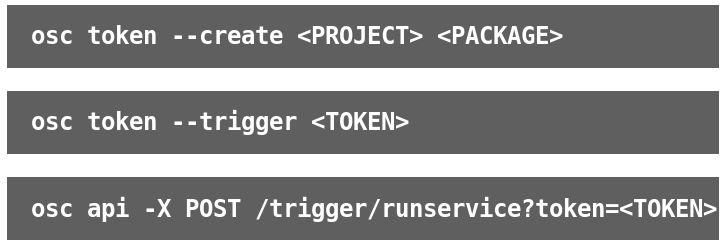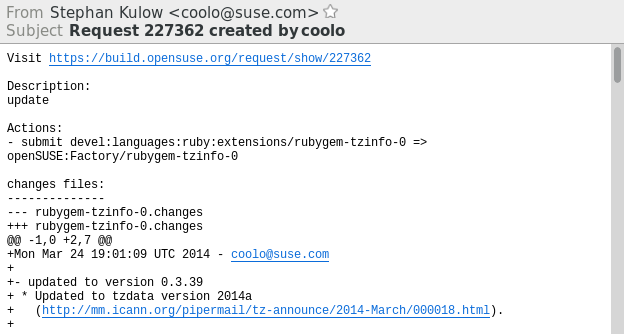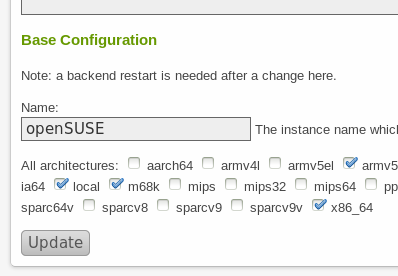Open Build Service version 2.5 released
Are you ready for another set of great features for your free software packaging needs? We are with version 2.5. of the Open Build Service(OBS). With this release you can plug OBS into your continuous integration/delivery chain thanks to the new token API that let's you trigger builds from revision control systems like github. 2.5 further merges the Web UI and API into one single Ruby on Rails app, so it is easier for you to maintain, easier for us to extend and most important way snappier to use for your packagers. This release also begins to unify the various places where you can configure things into the OBS API, introduces an integrated comment and notification system and saves your OBS servers some cycles by automatically cleaning up left over branches. As you can see our team never tires to be awesome! Read on for more, in depth, information about OBS version 2.5.
Let github.com trigger your source update
OBS 2.5 provides an API to create authentication tokens to allow the execution of source services. That means you do not have to use your secret login credentials for this, which makes it easy to hook the OBS into aps like github.com for your continuous integration/delivery needs. Check out an example of this 2.5 feature on our blog and make sure you read the chapter in our reference manual on this topic.
Web UI + API = ♥
This is the first OBS release that has the web user interface (Web UI) and the application programming interface (API) merged into a single ruby on rails app. A couple of months ago the team decided to do this for three reasons. Most importantly it would expose the API database, where nearly all the OBS data is stored, directly to the Web UI. Having direct access to the API database and getting rid of the layer in between with all the overhead (network, parsing, rendering etc.) makes the Web UI way faster, your packagers will feel this instantly! And as OBS admin you'll have one service less to maintain, monitor and support. Last but not least the new merged frontend also feels and behaves more like a standard Ruby on Rails app, which makes all OBS developers happier and more productive! Want to know more? Read about the merge on our blog!
New configuration API/interface
We try to make the OBS as flexible as possible, with sane defaults. Up until now there where several files, spread over the different OBS components to do that. With this release we conflated this into the new configuration API and started to get an admin panel going so you have one place to adapt your OBS to your needs. Once we'll finish and integrate the statistics into it, this is going to be your new browser home page! Make sure you read the configuration section in the README.UPDATERS file to learn more about this feature.
Integrated Comment and Notification System
Born out of a Google Summer of Code project from last year OBS 2.5 ships with comments for projects, packages and requests. We wanted to make it possible for our users to discuss things without ever leaving the OBS interface. The comment feature, the stalled development of the current notification solution and the WebUI+API merge, also lead to a brand-new integrated notification system. Up until now we have made used of a couple of external services (Hermes, RabbitMQ) to notify about events inside the OBS. But now we are in need of a more generic system that can handle a little bit more than sending events somewhere else. The most notable change are that notifications are more rich in content and the new ability for your packagers to configure their notifications inside the OBS. Additionally the notification system has been moved from the backend to the API. The backend system is still available but declared as deprecated.
Autodestruct sequence for ancient branches
The amazingly neat branch->change->submit exercise inside the OBS is the essence of the Free and Open Source developer workflow. Sometimes though, life gets in the way, and packagers have more important stuff to do, forget or otherwise loose interest in completing this cycle, which means there are undead branches laying around on your OBS which keep eating resources. Up until now it was a manual task to find and kill these. With OBS 2.5 branching a package automatically sets a time at which the branch will self-destruct (via an admin delete reuqest). This is a neat feature to save resources and build power on your OBS!
New Search Functionality
For years one of the biggest complaints about the OBS was that it was impossible to find packages. The search ability has been part of the interface from the beginning, but with over 200.000 packages being build today on our reference server it is crucial to get the right package. To get to this point Ancor, from openSUSE, integrated the sphinx search engine into the OBS, so the name, title and description of packages and projects can be combined with other attributes like the number of links/branches or activity over time, into one big index that allows page ranking. This makes it possible for us to tweak the settings so you find the package you're really looking for.
More information
If you are longing for a deeper look into all the changes this major version update bings check out the detailed 2.5 Release Notes. It is also recommended to read these before updating your OBS instance!
Try OBS 2.5
The reference server build.opensuse.org is available for all open source developers to build packages for the most popular distributions including openSUSE, Debian, Fedora, Ubuntu, Arch, Red Hat Enterprise Linux and SUSE Linux Enterprise. It is also used to build, release and maintain the openSUSE distribution.
Get OBS 2.5
You can download all the OBS components (Clients, API, Server, Worker) from our download page and setup your own Open Build Service instance.
About the Open Build Service
The Open Build Service (OBS) is a generic system to build and distribute binary packages from sources in an automatic, consistent and reproducible way. You can release packages as well as updates, add-ons, appliances and entire distributions for a wide range of operating systems and hardware architectures.
It is developed by a talented team of developers as Free Software and is used by many Free and Open Source software projects, companies and researchers. Including but not limited to SUSE the original provider of the enterprise Linux distribution, the Tizen standards-based software platform supported by leading mobile operators and ownCloud your secure enterprise file sync and share.




